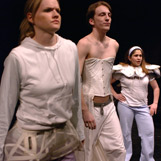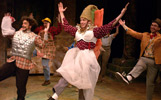
Practitioner Voices: Nancy Smithner
Interviewed September 2004 by Becca Gill as part of the Total Theatre Explores research project.
Nancy Smithner, performer and director, is a faculty member in the Program in Educational Theatre at New York
University, where she specializes in Physical Theatre,
Acting, Directing, Arts Integration, and the devising of
original performance works combining text, movement and music.
She is also a member of the Big Apple Circus,
performing for children in paediatric settings.
How do you describe your artform practice?
I am a performer and director and teacher but primarily now I am working in Academia.
I worked as a freelance performer and director for twenty-five years, and then felt that I needed to get some more stable work, so I got my PHD and now I am teaching full-time.
One side of my performance work is working with The Big Apple Circus in New York. I work as a clown and go into paediatric settings in hospitals and clinics and entertain the kids.
How do you describe your work?
I had my own company in the 80s that combined text, movement and music and vocal qualities, and visual elements. One of the reasons I went into acting was so that I could eventually end up doing my own work, but I found that I ended up doing a lot of directing of straight plays. This year, I am going to be able to put on my own work again, as I am going to be doing a piece on body image - this is an area I am very interested in.
What are your main areas of inspiration and do they change with each project?
The main inspiration for the piece I am doing this year is people's discomfort with there bodies - not just women, men and women, and the way that people view their bodies, and exploring the cultural codes that are imposed on us and how we react to that. It will be researched by myself and then devised with the students so that they have a large input into the piece. My inspirations change with each project; I've done a piece on chess! Using physical theatre, I've done works on dreams; I've done a lot of deconstruction of texts.
Does your body determine the work you make or the way in which you make it?
Absolutely, in fact the main inspiration for my work is probably improvising with the body, how the body makes form and then finds content. The text that is created arises then from a more subconscious motivational source.
Would you consider your artistic priorities to be different to those of men?
I believe that men have female characteristics and that women have male characteristics; that they are mixed. When certain studies are done about men's and women's brains the results are interesting.
One study I read said men are more structured and organised and authoritarian, and that women are more collaborative, softer, better at listening. In my ensemble work, I am dealing directly with the nature of collaboration and the ability to be able to absorb other people's ideas. But then there is a point in directing when I must become very forceful and structured as well, so it is a combination of both.
How would you define feminism?
That's a tough one! Feminism is equality for women, giving women more space so that they can rise up to the level men have been privileged to experience; having consideration for women's projects, no matter what age the artists are.
Would you call yourself a feminist and what does that term mean in relation to yourself and your work?
Absolutely, I am a feminist. I always seek in my work to give the woman's point of view. I do like to work with men as well, but I believe more and more that many men are feminists, and are open to an equal exchange.
Do you feel that the word feminism has shifted in meaning?
Only in that it seems to have a more negative connotation for people who didn't live through the feminist movement and do not realize what vast changes have been made as a result of that. My young students are empowered and secure; this seems to have been transmitted through the parents. Others have an extremely negative view of feminism, which is scary.
Do you think that theatre can effect social change?
Absolutely.
What do you see as the biggest problem facing women in performance today?
I think it is a financial question of production, it's a matter of getting backing, getting assistance and being able to fund that. For women who want to have families, it is a huge problem - for me, that was the main problem and the main reason why I gave up doing my own work, so I could make money and have a child. This also connects to the body, having time to work out or train to keep fitness at the right level for performance. Things that would help would be funding for older performers to carry on developing their own work alongside other commitments.
What from your perspective is the future for women within performance?
More and more women are making their own work - that's good and will grow, it is positive and more opportunities will become available.
Voices:



